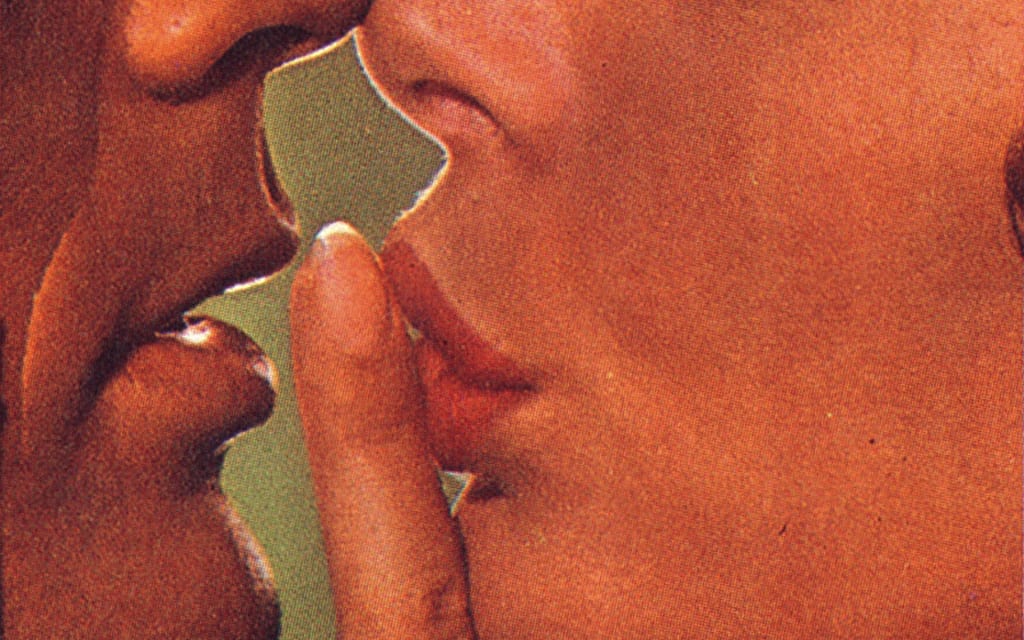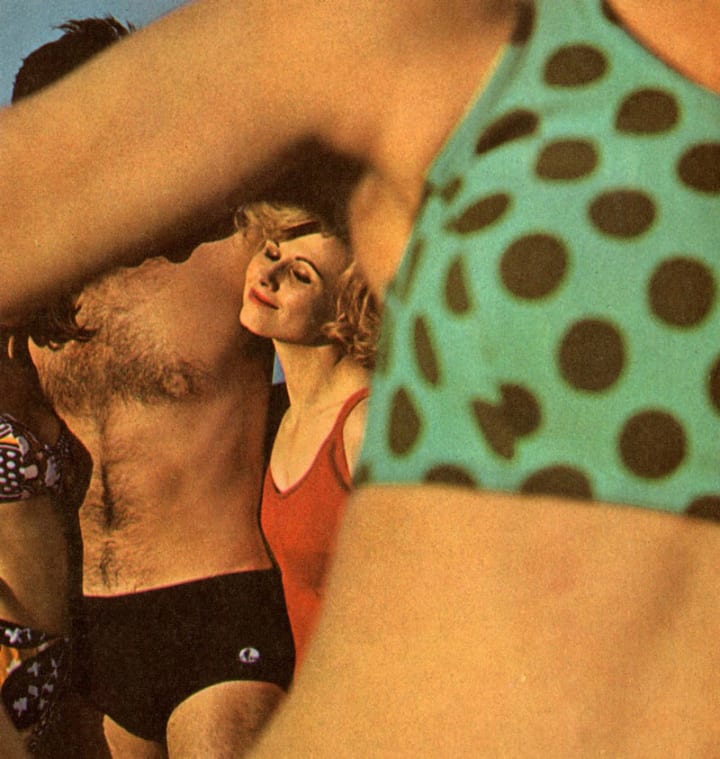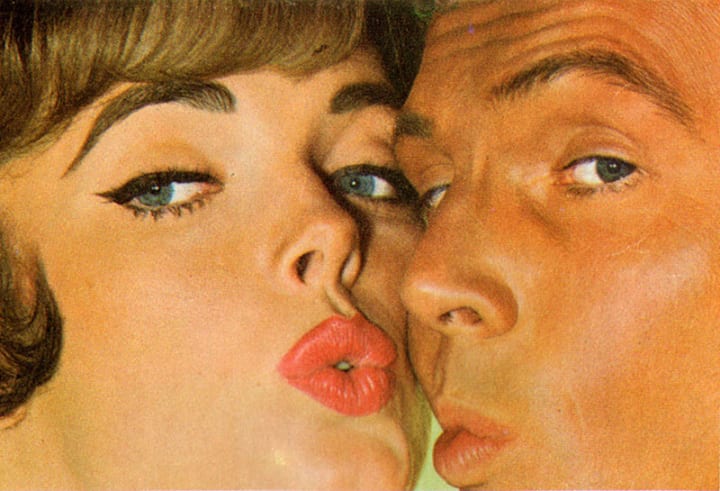Languages of Love
Making love with a foreign tongue is all part of the language of love.

Language is one of the most inhibiting factors in love play. There comes a moment when every American or English male traveling abroad sees a girl to whom he wishes to say something to the following effect: "Mademoselle... Fräulen... Signorina, you are exquisite. Only the pre-Raphaelites could have caught your eyes, your lips, your hair. Your laughter is as that of distant cowbells on verdant hills, and the Georgian poets alone could have described you, oh moon of my delight that knows no wane…"
The trouble is that there's a language barrier. Gathering all the resources of one's classical education, something is still lost in translation if the best one can muster is "Voolay voo cooshay avec moi? Nor does "Spaziergang, Frowlein" really ring the bell. "Oh sole mio" is admirable for starters. The snag is what comes next? And even if one knows by heart the words of La Donna é Mobile, what the song is about is that women are a lot of silly conceited nits.
Confusion Within Culture

Even in one's own language, dangers lurk. The unfortunate use of the word bum made G.I.s the victims of hearty English laughter during the war. On the other hand, if an Englishman in the United States is asked by an American girl to wake her up the following morning he will be nonplussed by her startled expression if he replies, "What time do you want me to knock you up, darling?" Even within a national culture, there are dangers of misunderstanding. In north-east England for example, a "tart" has no pejorative significance. It simply means a girlfriend ("I'm taking my tart to the pictures tonight").
One can get hopelessly lost even with the best of intentions. The French word for "kiss," if one looks it up in a dictionary, is "baiser." Rodin’s famous sculpture of a naked couple kissing is called "Le Baiser." But baiser as a verb means, quite bluntly, to indulge in the sex act. If the Anglo-Saxon wants merely a kiss he should ask to embrasser or else for une bise. If he asks for a baiser, he will either get a slap across the face or else delights, to which he never originally aspired. And if—heaven forfend—he tells a friend he would like to give a farewell baiser to the friend's darling ten-year-old daughter, he might finish up behind bars.
Actors like Fess Parker and Sean Connery make French moviegoers roll in the aisles with laughter. Fesse in French means backside, and a connerie is a foul-up. Dien Bien Phu was a classic example of a connerie. Not a word for polite intercourse. Conasse is probably the worst word a Frenchman can call a woman. If she is sufficiently spirited to reply she will call him a con. Rough translation is easy, and the whole scene is pretty rough anyway.
On the other hand, one is happy to note that the word "love" has a pleasing sound in all languages—amour, amor, amore, Liebe (all German nouns begin with a capital letter). Similarly the word "darling," chérie, cara, Liebling, the Russian daragaya, and I have a special faiblesse for the German Zucker püptschen (sugar puppy).
Above the Belt

Yet the breast, the fundament of physical love, is not evocative in any language know. The French sein lacks sensual connotation, and though I find the alternative word poitrine, melodious, the Frenchman prefers to kiss his girl friends seins and eat the poitrine of his chicken. Or if he is a vulgar fellow, he will refer to her nénés, or what the Englishman would call her "charlies" (origin unknown). The German Brust is similar to the English, and grood conjures visions of Russian peasants with white scarves around their heads, black dresses, and felt boots. The Italian petto makes one feel they must be kidding. The word is sheer baby-talk.
At the nipple, however, one begins to get to the point, as it were. Indeed the French word is bout de sein, "end of the breast." The German word is absolutely vile—Brustwart. What German girl of pride wants to go through life carrying a pair of breast warts on her chest? The Italian cappezzello sounds as if it would be delicious with tomato sauce and grated cheese, and the alternate word, poppa, suggests that the formulators of the Italian language have never left their mother's petto. The Russian word, sosok, may sound scrumptious, almost as edible as a cappezzello. All in all, however, I think the reader will agree that the good old English nipple, in this international competition of tasting and comparing, stands up extremely well from the standpoint of erotic connotation.
The word "tits" is usually used in a vulgar sense in the English language, and while the French tetons and the German Titten are almost identical, they are, in fact, much softer and gentler in the context of their own languages. French cabaret dancers also display splendid mamelons for the boys to enjoy. A girl is a fille, a Mädchen, a ragazza (Italian), dyevushka (Russian nouns have no definite or indefinite articles), all very pretty words. But it is a curiously vulnerable, delicate word, very open to vulgarization. In France, the very word fille until the beginning of the First World War, meant a girl of easy virtue. A girl de bonne famille was une jeune fille. The Russians, too have had girl trouble. At the 1917 Revolution, the old Czarist forms of address such as cyrdanya were suppressed and replaced by dyevushka. But many have come slowly to realize that it was damn silly to address someone like Mrs. Khrushchev as dyevushka, and the old forms of address, such as "Madam," are being gradually restored to proletarian respectability.
A healthy American girl is "well-stacked." In French, She has le monde au balcon—the world on her balcony, very slangy. The Italian girl, like Sophia Loren (though not Gina Lollobrigida), is rotondetta, and a Russian girl—what Russian girl isn't—is zhdarovy.
The American "broad," the English "bird," the French pépée, all succeed in achieving the object for which they were invented: to coarsen, to cut the girl down to size, in effect, to humiliate her. The interesting American poontang—rarely if ever used in England—is a corruption of New Orleans French for putain, or whore. So probably is the word "O.K.", one of the true mystery words of American speech, and certainly not irrelevant to our theme. All dictionaries hazard their own guess about the origin, and it is obvious that none of them have a clue. To me, the most pleasing and convincing theory is that it stems from the habit of New Orleans French customs officials who, after the cargoes were unloaded and cleared, stamped the crates au quas—on the quay, O.K.
Sex is "sex," more or less, in most languages (sexe, sesso, etc.) except Russian, where it is the intriguing pol.
English is enriched with three words for the condition of being without clothes, all with slightly different connotations: "Naked" (girl in a bathtub), "nude" (posing for artist or photographer), and "bare" (getting into bed with boyfriend). Most languages I know have one only—nu, nakt, nuda, nagoy. The French have a rollicking expression, à poile, literally "down to the hair," slightly less gross and Rabelaisian than the American "bare assed."
An Englishman would be able to hazard an educated guess should an American hooker offer to "french" him. The English equivalent verb, which has rather sunk into disuse since World War II, would be to "gam," from the noun gamerouche, an Arab word dating from the British military occupation of Egypt. The word "hooker" incidentally dates from the American Civil War, when General Hooker unwittingly established his headquarters in a bordello.
Below the Belt

The blunt, basic verb describing the sex act has a curious and unexpected history. On the surface the verb "to fuck" could scarcely sound more Anglo-Saxon, but in fact it has been bobbing around nearly all the Caucasian languages since Latin times in one form or another. The Middle English word "fucken" stems from an identical Germanic verb, meaning to strike, move quickly, penetrate. This stems from the near-Latin peik, to cut, make an incision, to prick. From there it goes back to the Latin pingere, to embroider, tattoo, prick. Today, vulgar Spanish for a penis is pinga. (As a matter of interest, the Greek word for "testicles" is antiquités.)
And talking—as we did earlier—about charlies, an entire article could be devoted to the word alone. In the south of England, a "charlie" is also a "bloody fool." In the north, it is slang for penis. I still recall from childhood an exchange at a wrestling match in St. James' Hall, Newcastle-on-Tyne:
First spectator, shouting: "Tickle 'im, Charlie!" Second spectator: "Tickle his Charlie!" (loud laughter).
What is not generally realized (until one thinks about it for all of half a second) is that there is a completely separate meaning to the word. It is obvious, even on the most superficial consideration, that the expression "fuck off" has no relationship whatever to sex.
This basic word has inspired, perhaps the most apt translation of a title in all the history of letters. In English, Marivaux's classic comedy, On ne badine pas avec l’amour comes out, "You Don't Fuck About With Love." Try to think of a better translation, scholars!
Oddly, the word for "pussy," meaning that which adorns a lady, is "cat" in every language I know, and the Universal Dictionary can trace its use in this context back as far as 1583. A pussy-Nellie was Royal Naval slang for a male homosexual in Victorian times. The reason I find it curious is because it seems to me so wholly inapt. A cat's fur is symbolic of smoothness. A girl's pubic hair tends to be coarse. Indeed, at the risk of sounding vulgar, there is a widely held theory that the silkier the girl's crowning glory, the coarser is likely to be her pubic hair. But I am straying far from the point. A German girl who wishes to draw someone's attention to her vagina, refers rather coyly to meine Dame (pronounced "dahma").
Words like "penis" and "erection" are similar in origin in all languages (a Frenchman in that felicitous condition would describe himself as bandé). "Happy" is a happy word in all languages, joyeux, heureux, glücklich, felice and in Russian schastlivi.
The Sound of Love

I have dealt here with only such languages as I know personally—English, French, Italian, German, a few words of Spanish, and a reasonable smatter of Russian, all reinforced by dictionaries, principally the American Heritage and the Oxford Universal. The examination indicates that words of love tend generally to fall pleasantly on the ear, and come trippingly to the tongue. Compare them to the roaring sound of "war": guerre, Krieg, voina. I have often wondered what love words sound like in the most melodious of all the world's languages, Japanese. I suppose I could satisfy my curiosity by buying a Japanese-English dictionary, or asking a Japanese export salesman, but I have rather feared disappointment. The Japanese seem incapable of uttering anything but the most beautiful of sounds. A language that can turn hideous realities into words of which dreams are spun—hara kiri, samurai, kamikaze—must have a dazzling lexicon of lovers' words, even if we cannot understand them.
Sayonara… mon amour!
About the Creator
Filthy Staff
A group of inappropriate, unconventional & disruptive professionals. Some are women, some are men, some are straight, some are gay. All are Filthy.






Comments
There are no comments for this story
Be the first to respond and start the conversation.